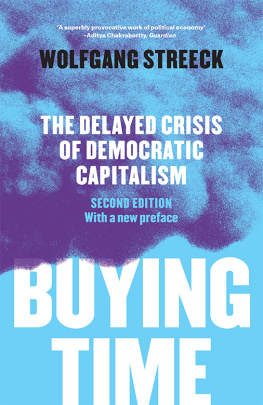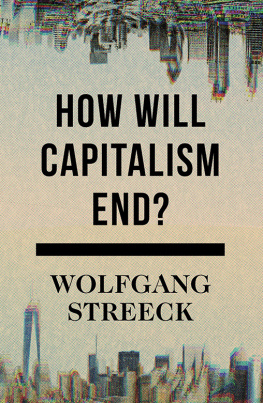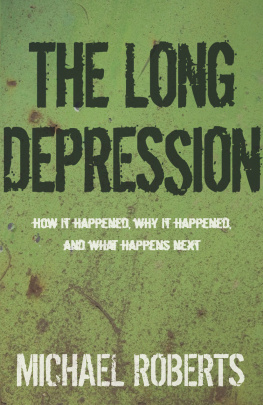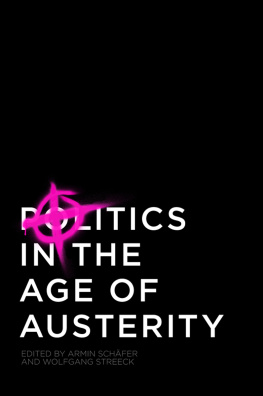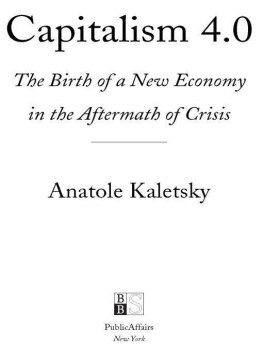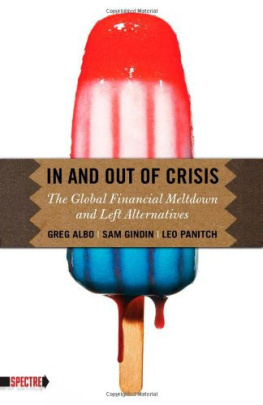Buying Time
The Delayed Crisis
of Democratic Capitalism
Second Edition
With a New Preface
Wolfgang Streeck
Translated by Patrick Camiller and David Fernbach

The translation of this work was funded by Geisteswissenschaften International Translation Funding for Humanities and Social Sciences from Germany, a joint initiative of the Fritz Thyssen Foundation, the German Federal Foreign Office, the collecting society VG WORT and the Brsenverein des Deutschen Buchhandels (German Publishers & Booksellers Association).
This second edition first published by Verso 2017
English-language edition first published by Verso 2014
Translation Patrick Camiller 2014, 2017
Preface to the Second Edition Translation David Fernbach 2017
First published as Gekaufte Zeit
Suhrkamp Verlag Berlin 2013
All rights reserved
The moral rights of the author have been asserted
1 3 5 7 9 10 8 6 4 2
Verso
UK: 6 Meard Street, London W1F 0EG
US: 20 Jay Street, Suite 1010, Brooklyn, NY 11201
versobooks.com
Verso is the imprint of New Left Books
ISBN-13: 978-1-78663-071-1
British Library Cataloguing in Publication Data
A catalogue record for this book is available from the British Library
The Library of Congress Has Cataloged the Hardback Edition as Follows:
Streeck, Wolfgang, 1946
[Gekaufte Zeit. English]
Buying time : the delayed crisis of democratic capitalism / Wolfgang Streeck ; translated by Patrick Camiller.
pages cm
First published as Gekaufte Zeit, Suhrkamp Verlag, Berlin, 2013.
ISBN 978-1-78168-549-5 (hardback) ISBN 978-1-78168-619-5 (ebook)
1. Capitalism. 2. Neoliberalism. 3. DemocracyEconomic aspects. 4. Economic policy. 5. Financial crises. I. Title.
HB501.S919513 2014
330.122dc23
2014003057
Typeset in Minion Pro by Hewer Text UK Ltd, Edinburgh
Printed in the UK by CPI Mackays
Contents
It is more than four years since I completed the manuscript of Buying Time.
THE HISTORY OF CAPITALISM AS A SEQUENCE OF CRISES
In Buying Time, I treat the global financial and fiscal crisis of 2008 not as a freestanding individual event, but as a part of, and tentatively also a stage in, a historical sequence. I distinguish three phases: the inflation of the 1970s, the beginning of public indebtedness in the following decade, and the increasing debt of both private households and businesses, in both the financial and the industrial sector, since the mid-1990s. Common to these three phases is that each of them ended in a crisis whose solution was at the same time the starting point of a new crisis. In the early 1980s, when the central bank of the United States ended inflation worldwide by a sharp rise in interest rates, public debt rose, more or less as a balance to this; and when this was redressed in a first wave of consolidation in the mid-1990s, private household debt rose, like a system of communicating vessels, and the financial sector expanded with unprecedented dynamism, until it had to be rescued by states in 2008 at the expense of their citizens.
It was not my discovery that underlying all these developments was a conflict over distribution that arose, once postwar growth had come to an end, from the increasing inability of the capitalist economic system and the unwillingness of its elites to meet the demands of democratically constituted postwar societies; contemporary political-economic analyses of inflation, public debt and financialization had come to more or less the same conclusion. My contribution in this book, and in the work that preceded it, was perhaps to explore the parallels and the common denominator and in this way to propose an analytical framework for crisis theory which should basically be applicable also to the present phase in the development of global capitalism.
Buying Time shows how, alongside inflation, state debt and the bloating of financial markets, growth in the mature capitalist countries has diminished since the 1970s, while inequality of distribution has increased and total debt has risen. Simultaneously, electoral participation experienced a long-term decline, trade unions and political parties
CAPITALISM AS A UNITY
It could not escape readers that my book treats the capitalism of the OECD countries as a unity, albeit a diverse one constituted both by interdependence, including collective dependence on the United States, and by common internal lines of conflict and problems of systemic integration. Some readers have accordingly raised the question of how someone who previously studied the differences between national capitalist systems can now suddenly stress their commonality. The answer is that difference and commonality are not mutually exclusive, and that depending on the problem one is seeking to understand either one or the other may have to be highlighted. In the present case, the rather holistic perspective of investigation was again first and foremost inductive: it resulted from the empirical fact that many of the phenomena connected with the crisis of 2008, and the crises, sequences of events and processes of change observable since the 1970s, were common to the countries of OECD capitalism, and indeed to a surprising degree often staggered in time, sometimes taking different national forms, but unmistakeably marked by the same logic and driven by the same conflicts and problems, as documented by the numerous diagrams contained in this book.
I was not, however, unprepared for this. In working on a book on longer-term change in the German political economy,
HISTORY AND PREHISTORY: THE EXCEPTION AND THE RULE
The sequence of crises whose inner connection I believe I have traced begins in the years between 1968 and 1975. Since every history has a prehistory, its beginning is always just as open as its end. Yet anyone who wants to recapitulate a historical chain of events must choose a starting point. There should of course be good reasons for the choice made, and possibly I should have made my own reasons more clear. The 1970s are the time when the critical developments depicted by my curves began: inflation, state debt, market debt, structural unemployment, falling growth, rising inequality, with national deviations but always in the same direction sometimes with interruptions, often at different levels, but always recognizable as general trends. The fact that the 1970s were a turning point is today almost commonplace, not only in political economy
at any time. The first half of the twentieth century teaches this better than the second half, since the latter contains the exceptional years of the trente glorieuses, the Golden Age or the Wirtschaftswunder, which still continue to shape the common consciousness, certainly in Germany, even though what has happened since the 1970s, and for the time being culminated in the crisis of 2008, can only mean that this exceptional time was precisely that and that its repetition should absolutely not be expected.
Summing up, the years between the end of the war and the age of fracture,after). This was expressed, among other things, in the widespread conviction at this time that capitalism could only continue as an accepted economic and social order if it benefited the ordinary man and woman in the form of social progress; that it had to deliver full employment, social security, greater autonomy at work and more time outside of it, an end to material poverty and cyclical economic crises, etc. Of course, these were far from universally established realities. But even deep into the conservative camp there was the basically unchallenged idea that social progress was an obligation on the part of political and economic elites, not necessarily payable all at once, but at least step by step and year by year, to be achieved if need be with the assistance of strong trade unions and effective political mobilization in the context of democratic institutions, and by way of an economic policy that sought to achieve growth by redistribution from top to bottom rather than the other way round in Keynesian rather than Hayekian manner which, in view of political conditions, it could not have done otherwise anyway.

